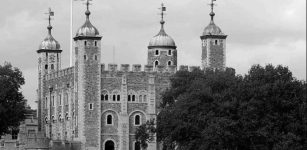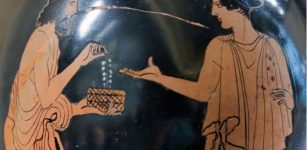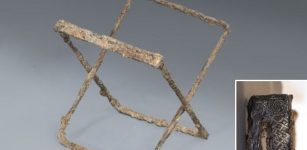Centuries Old Pub Discovered In Dover, England
Conny Waters - AncientPages.com - Pubs are an integral part of English culture, serving as social hubs that unite people in various ways. The roots of the British pub can be traced back nearly 2,000 years to Roman times. When the Romans invaded Britain in 43 AD, they introduced Roman roads, towns, and tabernae—shops selling wine—to support their legionary troops. These early establishments laid the groundwork for what would become the modern pub.
An example of Bellarmine jugs from the 17th century similar to those recently found in Dover. Credit: Hadley Paul Garland - CC BY-SA 2.0 - Right: The Ale-House Door (painting of c. 1790 by Henry Singleton) Public Domain
As the Roman Empire declined and withdrew from Britain in the fifth century, Anglo-Saxons took over. Unlike their predecessors who favored wine, Anglo-Saxons preferred ale. This shift led to tabernae evolving into alehouses or taverns—places where ale was brewed and sold alongside offering lodgings.
Alehouses quickly gained popularity as entrepreneurs recognized their profitability. By 957 AD, King Edgar attempted to regulate them by limiting each settlement to one alehouse; however, this restriction was short-lived. Following the Norman conquest of 1066, there was a significant increase in alehouses across England as Norman influence spread through imposing structures like castles and cathedrals.
Today’s abundance of pubs throughout England reflects this rich history of evolution and adaptation—a journey further illuminated by recent discoveries in Dover that shed light on how these beloved institutions have transformed over time.
Amid ongoing excavation efforts at the site of a former nightclub in Dover, England, archaeologists have discovered numerous artifacts believed to be from a centuries-old pub. The Canterbury Archaeological Trust team has unearthed a pit filled with hundreds of clay pipes, German wine bottles, and Bellarmine jugs, contributing to an expanding collection of historical items found nearby. Since April, the team has been working on developing a new creative and digital hub and has made several significant discoveries during this process.
Ross Lane from the Canterbury Archaeological Trust leads this dig and reported to the BBC that "a pit contained lots of refuse material including the clay pipes."
Additionally, they discovered several Bellarmine jugs—glazed stoneware imported from Germany prevalent in the 16th and 17th centuries—and wine bottles that may further indicate that this location was once home to a public house.
See also: More Archaeology News
Lane suggested that due to its association with smoking and drinking activities, much of the Bellarmine ware might have been brought over containing wine from Germany. This implies it could have been part of a public house's backyard facing Bench Street. The team anticipated uncovering fascinating finds at this historically rich site; previous discoveries include a Bronze Age boat in 1992 and a medieval spindle wheel.
This archaeological work is part of developing Dover Beacon—a new community space described by local authorities as "iconic."
Written by Conny Waters - AncientPages.com Staff Writer





















